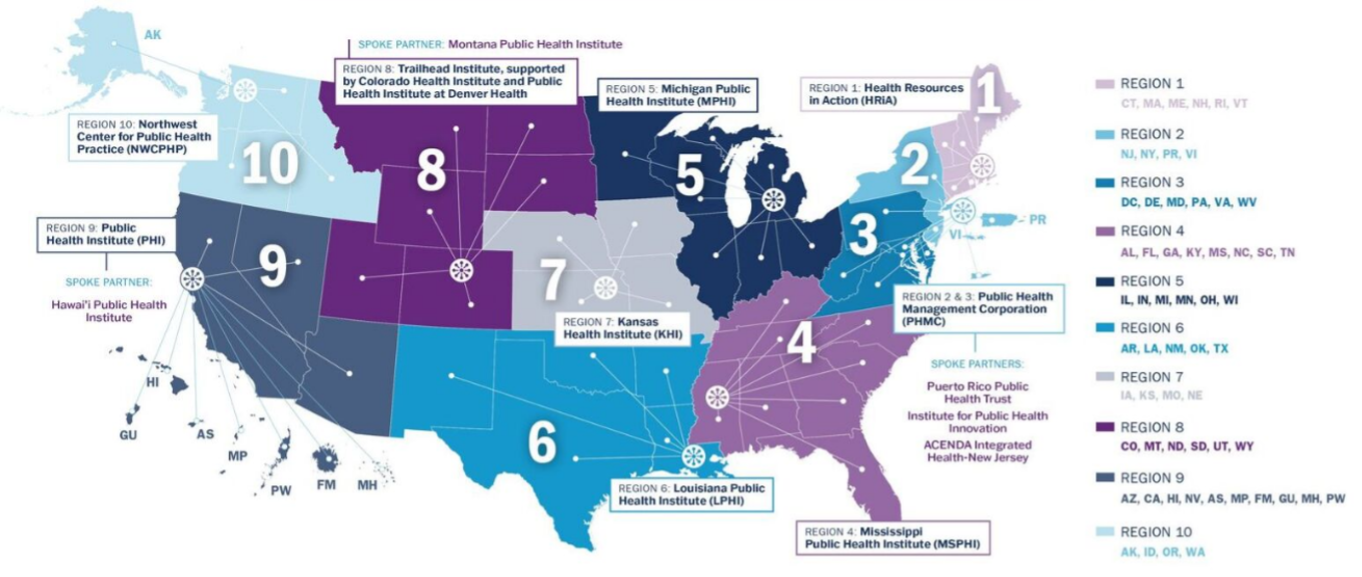Public Health Infrastructure Grant (PHIG)
YEAR 1 REFLECTIONS: PHIG Recipients and partners tell us what opportunities PHIG has created for their agencies and the public health field at large.
PHIG is a groundbreaking, multi-billion-dollar investment from the Centers for Disease Control and Prevention (CDC) to help health departments across the United States strengthen their workforce and infrastructure. Funding from this grant is designed to ensure that health departments have the people, resources, and systems they need to assess, promote, and protect health in the communities they serve. Funding was awarded to 107 state, local, and territorial health departments, and will be distributed over a five-year period.

In addition to providing technical assistance, the national partners will track and share progress, facilitate communication and coordination between the CDC, PHIG recipients and other partners, and evaluate the program.
Our Work
NNPHI’s work on PHIG includes three focus areas: training and technical assistance, PHIG program evaluation, and PHIG coordination and communication.
Technical Assistance for PHIG Recipients and Regional Innovation Hubs

NNPHI is using a “regional innovation hub” model to provide training and technical assistance to PHIG recipients. A PHIG Regional Innovation Hub consists of one or more non-governmental public health organizations that work with state, local, territorial, and tribal health departments to analyze and operationalize essential public health functions in their regions. A public health institute serves as the central coordinating body for each Hub, and may be supported by additional public health organizations and/or a Public Health Training Center (housed within schools of public health). These additional partners serve as Spokes to the Hubs. Hub and Spoke organizations bring deep subject matter expertise, local knowledge and trusted relationships, and extensive experience across a wide range of public health topics.
The Hub model allows NNPHI to coordinate and deliver tailored training and technical assistance to PHIG recipients across the entire United States. Using the Hubs to provide PHIG technical assistance is also intended to foster sustainable collaboration and supportive relationships across the public health system that last beyond the grant period.
PHIG recipients request technical assistance through the Public Health Infrastructure Virtual Engagement (PHIVE) tool, an online system managed by NNPHI that serves as a one-stop-shop for technical assistance and administrative support. When a request is submitted, NNPHI and the national partners will coordinate and triage responses to those requests, primarily through the Hubs. NNPHI and the Hubs will also use PHIVE to identify broader technical assistance trends and opportunities, and proactively develop technical assistance tools that anticipate health department needs and encourage innovation.
PHIG Program Evaluation
NNPHI and the Public Health Accreditation Board (PHAB) are responsible for evaluating the impact and success of the PHIG program. NNPHI and PHAB developed a collaborative partnership model called the PHIG National Evaluation Team (NET). The NET works closely with CDC and selected subcontractors to lead, coordinate, and implement evaluation activities.
A key facet of the PHIG evaluation is the inclusion of an Evaluation Advisory Group (EAG). The EAG will be composed of individuals and organizations that will actively use the evaluation findings, including PHIG Recipients, National partners, CDC staff, and other organizations impacted by the PHIG. The EAG will provide a mechanism for participants to guide how the evaluation is designed and implemented, as well as how findings are interpreted and disseminated.
NNPHI serves as the lead organization coordinating the Evaluation Advisory Group (EAG), in partnership with the University of North Carolina’s North Carolina Institute for Public Health (NCIPH), Center for Health Equity Research at UNC-Chapel Hill (UNC CHER).
PHIG Coordination and Communication: Convenings
Slideshow of photos from Regional PHIG Hub Convenings, June 2023 – March 2024
All three National Partners will help PHIG recipients connect with one another to share their experiences, strategies, resources, and lessons learned as they work toward similar goals. The National Partners will also help coordinate communication between PHIG recipients and CDC project officers and supporting staff. One of NNPHI’s major roles is to coordinate in-person, virtual, or hybrid convenings that allow PHIG recipients to connect with their counterparts in neighboring states or areas, share findings and lessons learned, and build ongoing partnerships. To this end, the NNPHI Convenings team does the following:
- Supports Regional Innovation Hubs in hosting regional convenings
- Coordinates with ASTHO, PHAB and CDC to host an annual meeting for PHIG recipients from across the country.
- Hosts the Open Forum: Next Generation conference
- Works with specific communities of practice to host in-person or virtual trainings, workshops, and strategy sessions.
PHIG Coordination and Communication: NNPHI-Led communications
While ASTHO leads the communications elements of the project, all three National Partners play a vital role in keeping PHIG recipients and partners informed and engaged. NNPHI and other partners will also work together to tell the larger story of PHIG-funded work to external public health practitioners, media outlets, policymakers, and the general public. NNPHI will help identify data and stories that demonstrate PHIG’s contributions to building public health infrastructure, describe how investments in public health infrastructure impact communities, and inspire the next generation of public health workers. We will use innovative approaches, including audio, video, and social media formats to craft compelling stories describing PHIG progress, successes, and challenges. These stories will be shared through a broad variety of channels, including the PHIG website and newsletter.
CONTACT US
For more information, please contact us at PHIG@nnphi.org.
This work is supported by funds made available from the Centers for Disease Control and Prevention (CDC) of the U.S. Department of Health and Human Services (HHS), National Center for STLT Public Health Infrastructure and Workforce, through OE22-2203: Strengthening U.S. Public Health Infrastructure, Workforce, and Data Systems grant. The contents are those of the author(s) and do not necessarily represent the official views of, nor an endorsement, by CDC/HHS, or the U.S. Government.
 Subscribe To Our Communications
Subscribe To Our Communications